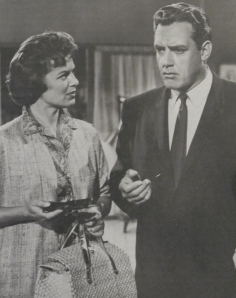"...Because we believe in peace, and because of our conviction in international legitimacy, and because we had the courage to make difficult decisions for our people, and in the absence of absolute justice, we decided to adopt the path of relative justice, justice that is possible, a justice that could correct part of the grave historical injustice committed against our people. Thus, we agreed to establish the state of Palestine on only 22 percent of the territory of historical Palestine, on all the Palestinian territory occupied by Israel in 1967." –PA President Mahmoud 'Abbas speaking before the UN General Assembly upon submitting the bid for UN recognition of a Palestinian state on the 1967 borders[1]
"Hamas has agreed to the establishment of a Palestinian state on the 1967 borders with Jerusalem as its capital and with the implementation of the [refugees'] right of return. This is a position that is largely shared by all the Palestinian forces and all the Arab and Islamic elements... The two-state solution includes recognizing Israel. We in Hamas have a clear position that rejects recognition of Israel... Over half of the Palestinian people belong to the 1948 territories, [since] they were born there or else their parents or grandparents were born there. So they belong to this land and are not newcomers to it; they were expelled from it by force. [Therefore], it would not be fair for any Palestinian movement to come along and recognize Israel."– Hamas political bureau head Khaled Mash'al in an interview with the daily Al-Hayat[2]
Introduction
At the December 9 opening ceremony of the 2011 Pan-Arab Games in Doha, a map was presented depicting a Palestinian state limited to the West Bank and Gaza– namely a state on the 1967 borders (see image below).[3] Palestinian Authority (PA) President Mahmoud 'Abbas, who was present at the ceremony, did not react to the map. The incident sparked a public debate among the Palestinians regarding the borders of Palestine.
This debate reflects a controversy among the Palestinians regarding their aspirations for statehood and their dealings vis-à-vis Israel and the international community. Specifically, the debate underscores the reluctance among many Palestinians – including PA supporters – to accept the 1967 borders and relinquish the dream of "historical Palestine," notwithstanding the Oslo Accords, the PLO's recognition of Israel, the Palestinian leadership's avowed commitment to a two-state solution, and this leadership's recent bid for UN membership for the Palestinian state based on the 1967 borders. The debate also brought to the fore the differences between the PA's and Hamas's understanding of the notion of a Palestinian state on the 1967 borders. Though both assert that such a state constitutes the basis for their joint political program, the PA considers it part of a two-state solution and a comprehensive permanent agreement with Israel, including a resolution of the refugee issue (which the PA has presented ambiguously in two versions: "a just and agreed-upon solution" and "the refugees' right to return to their pre-1948 homes"). Senior Hamas officials, on the other hand, stress that, though they accept a Palestinian state on the 1967 borders, they refuse to recognize Israel, relinquish the full right of return for refugees, or renounce armed resistance.
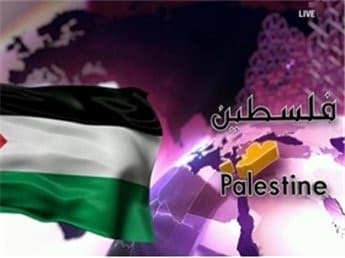
The map of Palestine (marked yellow) presented at the opening ceremony of Pan-Arab Games in Doha[4]
The Arab and Palestinian media reported on the public outrage in response to the map presented in Doha. For instance, it was reported that a heated debate broke out among spectators at the opening ceremony of the Pan-Arab Games, and that Arab youth called for their countries' delegations to the games to withdraw and return home.[5] Daoud Mutawalli, head of the Palestinian delegation, demanded a clarification from the Arab Games Organizing Committee (AGOC). Gaza's labor unions, which took part in organizing the games, demanded an apology for the map and called on the Arab League to investigate the matter and demand an account from those responsible. According to the union, the map was unacceptable, as it represented a clear recognition of the "Zionist entity" and submission to American plans for a new Middle East.[6] Palestinian youth launched a Facebook page called "No Partition of Palestine, Qatar."[7] Jordanian activists staged demonstrations outside the Qatari embassy in Amman,[8] while at another demonstration in Jordan, Palestinians burned pictures of the Qatari emir.[9] The Islamic Jihad student movement organized a demonstration in Gaza calling to boycott Qatar and recall the Palestinian ambassador from Doha unless Qatar apologized for the map. The protestors, who numbered in the hundreds, demanded not to relinquish historical Palestine, from the Jordan River to the Mediterranean Sea.[10]
As mentioned, the matter sparked a public debate over the borders of the Palestinian state and the proper way for the Palestinians to conduct their affairs vis-à-vis Israel. The press and websites belonging to the PA, Hamas, and independent Palestinian bodies fervently discussed the matter, with reactions falling into two categories: on the one hand, attacks on Qatar, accusing it of presenting a distorted and partial map of Palestine, and even of being party to a Western plot against the Arabs and Muslims; and on the other hand, calls for the Palestinians to recognize that the borders shown in the Qatari map are the very ones they themselves are demanding.
Palestinian officials, from both the PA and Hamas, avoided joining the public debate. Their silence led a number of writers to question why the PLO had not voiced any official protest to the map, and if this indicated that Palestinian officials had relinquished the dream of historical Palestine.
Criticism of Palestinian Officials' Silence over the Incident
The silence of Palestinian officials over the incident, from both the PA and Hamas, aroused amazement and anger among the Palestinian public and press. According to reports, many Palestinians on the social networks asked why Mahmoud 'Abbas, who was present at the ceremony beside Qatar's emir, had made no attempt to protest the Qatari map.[11] Al-Ayyamcolumnist Ghassan Zaqtan wrote: "The official Palestinian silence is painful. Worse yet is the silence of the heads of the 'rejectionists' [i.e., Hamas], the allies and friends of Qatar who held up pictures of its emir in the streets and marches in Gaza, while preventing [people from holding up] pictures and flags of natives of this land [i.e., Fatah members]... who sacrificed their lives on its soil..."[12]
In an article published by the independent Palestinian news agency Ma'an, publicist and researcher Fares 'Abdallah asked why Hamas and the PA were silent over the affair. He asked why Hamas had not organized protest rallies in the streets of Gaza, and wondered how its silence could be reconciled with its fundamental principles, such as its commitment to a Palestinian state on all the land between the river and the sea:
"What is the role of the PA, whose president participated in the festivities in Qatar? And what is Hamas's stance on this crime? Why didn't the Palestinian sports delegation leave in protest over the crime of cutting up Palestine?... Some might say that President 'Abbas is not part of the resistance to begin with, since he already recognized 'Israel' as the state of the Zionists when he signed the Oslo Accords, and [considering that] he reiterates this recognition every chance he gets! Do not expect an official stance from the PA. The educational materials [presented] to our students describe Palestine as extending from Rafah to Jenin, rather than from Rafah to Ras Naqura.
"The great and heavy burden lies with the Hamas movement, which is celebrating the 24th anniversary of its founding. Does it accept a Palestinian [state] on the Qatari scale? What is the stance of its public, which will gather at Al-Katiba Square [in Gaza] on December 14 and read out Hamas's fundamental principles, [including the principle] that Palestine stretches from the sea and the river, and that every handbreadth and grain of Palestinian soil is Muslim property that cannot be relinquished under any circumstances? And why is the Hamas media silent over this abominable act by the Qatari regime? Why don't we see marches and protests in Gaza's streets, such as Hamas would organize over any domestic incident in the [West] Bank, which has been abandoned to its fate?..."[13]
PA Columnists: A Map of Palestine on the 1967 Borders – A Distortion of History, a Premature Decision of the Palestinian-Israeli Conflict
Articles published in PA dailies and by the Ma'an news agency criticized the Qatari map. PA columnists claimed that, as long as there was no permanent peace agreement with Israel which clearly defined the borders of the Palestinian state, it was a mistake to present a map with any borders other than those of historical Palestine – because doing so would decide the outcome of the Israeli-Palestinian conflict prematurely. Independent Palestinian columnists wrote that, by ignoring the "historical Palestine" ingrained in the collective Palestinian memory, Qatar had distorted history as part of a Western plot against the Arab region. In addition, Qatar was criticized generally for its conduct in various Middle East affairs and for its ties to the West, especially the US and Israel. It should be noted that the PA has criticized Qatar on several pervious occasions over various issues.[14]
Mahmoud Abu Al-Haijaa, columnist for the PA daily Al-Hayat Al-Jadida, said that, as long as there was no peace agreement with Israel with clearly defined borders for a Palestinian state, only the map of historical Palestine should be presented: "Qatar will tell us that the map that was presented at the Arab Olympics was the essence of the Oslo Accords and their final outcome. We will reply that this is true, but that Oslo was an agreement of principles and a political move, and not a peace agreement. The conflict is not yet over, and the negotiations have encountered difficulties that do not suggest any progress which might allow one to envisage finalized maps [outlining] a geography of peace in the region... Had we reached a true and final peace with Israel, we would have accepted the innovative[15] Qatari interpretation... regarding the borders of the 'new Palestine.' We would have even been pleased if Qatar were able to stop the Israeli settlement within the boundaries of this map. But there is no peace in the region, and Qatar does not stand up to the Israeli settlements..."[16]
A similar claim was raised by Ghassan Zaqtan, columnist for the PA daily Al-Ayyam, who said that Qatar had "ignored historical Palestine as it exists in the imagination, memory, geography, and history of the region." He added: "The committee that organized the Pan-Arab Games in Doha decided the Palestinian-Israeli conflict [prematurely]. It [presented] the Palestinian flag with its four colors, and added the two separate [maps] of Gaza and the [West] Bank, with the name 'Palestine' in Arabic and English. What is also striking about this Qatari farce is that it avoided indicating the Israeli settlements in the [West] Bank, and [addressing] the question of Jerusalem... Where is the capital of Palestine located according to this innovative[17] interpretation by Qatar's rulers and allies, the representatives of the rising political Islam in the Arab region?"[18]
Notwithstanding the PA's silence over the Qatari map affair, several days after the incident, the PA daily Al-Hayat Al-Jadida, published two cartoons addressing the importance of historical Palestine, though avoiding any explicit reference to the incident in Qatar.
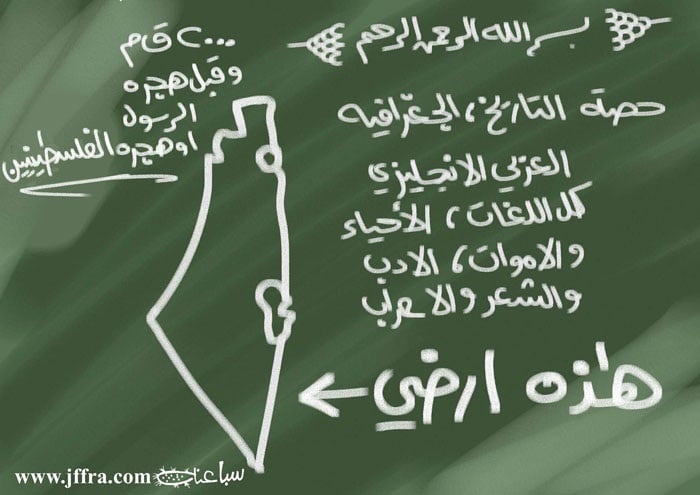
"In the name of Allah, the merciful and the compassionate. A lesson in history, geography, Arabic, English, all languages, life and death, literature, and grammar: [even] before the Messenger's hijra or the hijra of the Palestinians, this is my land."[19]
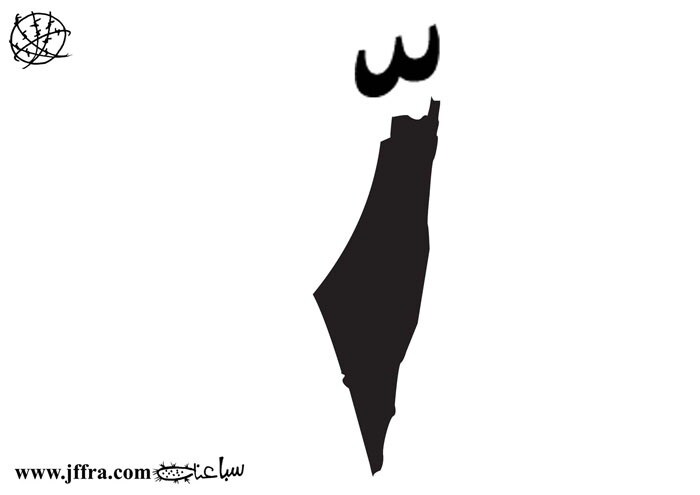
A map of historical Palestine with a shadda, the Arabic sign of emphasis[20]
Bahaa Rahal, columnist for the independent Palestinian news agency Ma'an, wrote that Qatar had "changed the historical map of natural Palestine, replacing it with a new map that it invented... This is a clear fabrication of history and of the cause of a people which continues to make sacrifices for the sake of freedom and independence. This is the main part of a greater plot in the region, to which Qatar is party, along with the US – one aimed at realizing the aspirations of the Western countries... Qatar is also party to the plot of the Israeli occupation state. It presented a map of Palestine to the world in a false and despicable manner... and thus did what [even] the enemies do not do. It renounced its nationalism and Arabness and followed the devil..."[21]
In another Ma'an article, Palestinian publicist and researcher Fares 'Abdallah wrote: "It would seem that the first phase of [the plan to] redivide the Arab region according to Zionist-American interests has begun. The new map of Palestine, drafted in Qatar, perhaps exposes a [new] Sykes-Picot [Agreement] under the guise of the Arab Spring... [This is suggested by the fact that] the Egyptian regime of Mubarak is [actually] still in power, and the crises which Egypt has experienced daily since Mubarak's ouster are an attempt by the [Supreme] Council of the Armed Forces to force [on the Egyptian people] the American position on the character the regime [should take] following the revolution..."[22]
In another article published by Ma'an, Palestinian publicist 'Ali 'Obeidat wrote that all the Palestinian factions owed the Palestinian people an apology for having accepted the Oslo Accords and agreeing to relinquish historical Palestine: "My heart goes out to Qatar, which aroused the world's unremitting anger by showing a map of Palestine with missing parts, without the river and the sea. Were it not for Allah's mercy, we would attack Qatar with ballistic missiles for its great sin... [However,] wasn't it the Oslo authority [i.e., the PA]... that extinguished the dream of historical Palestine? Wasn't it you [the Palestinian factions] who said that Haifa and Jaffa no longer belong to us, and that we want [only] Nablus, Ramallah, and Jenin, or whatever Israel [chooses to] give us?
"Find [me] a single Palestinian faction that wants historical Palestine – and don't say 'Hamas' or 'the left,' [because] all of them are party to the disgrace of Oslo... The dubious frankness of Qatar removed the fig leaf and exposed our inmost [nature]. You [Palestinian factions] must all apologize to the martyrs, the prisoners, the oranges of the Galilee, the cypresses of [Mount] Carmel, the pomegranates of Kafr Kana, and the old woman who continues to defend her Palestinian [identity] there... Ultimately, if Qatar needs to apologize for the deliberate step [it took], it should apologize to the refugees in the camps of the diaspora, to the steadfast [Palestinians living] 'inside' the occupation [state], and to the small group that continues to believe in an indivisible historical Palestine, from the sea to the river..."[23]
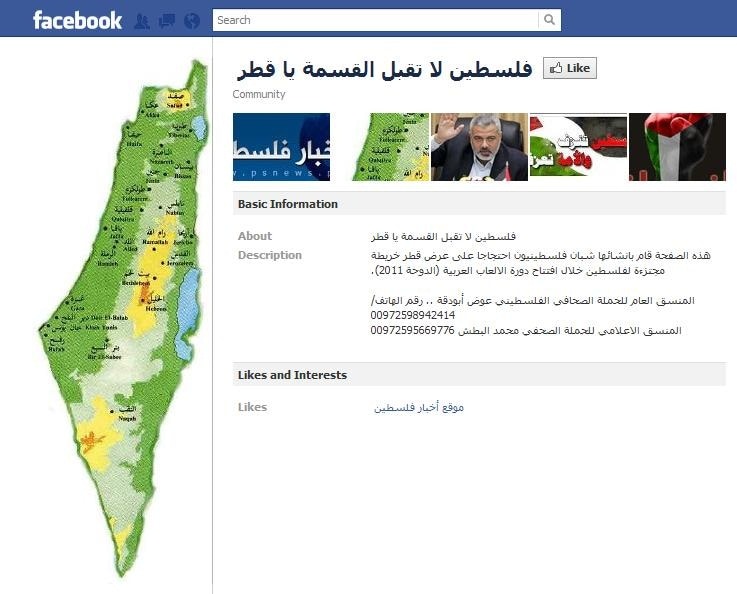
Facebook page titled "No Partition of Palestine, Qatar"[24]
PA Columnists: A State on the 1967 Borders Is the Realistic Solution
More pragmatic views were presented by PA and Fatah columnists and media outlets. They justified Qatar's presentation of the Palestinian map by pointing out that the Palestinians themselves were demanding that the world recognize the same borders as those it depicted. They called on the Palestinians to differentiate between the dream of historical Palestine and the reality on the ground, in which the Palestinians could, in fact, establish a state on the 1967 borders.
Yahya Rabbah, former PLO ambassador to Yemen and columnist for the PA daily Al-Hayat Al-Jadida, said that the map presented by Qatar was the same map presented by 'Abbas to the UN, and that all Palestinians accept it: "[This] map has been accepted by all of us, without exception – Fatah, Hamas and everyone in between. It was first approved as part of the 1974 Ten-Point Program and again as part of the 1988 declaration of independence. These are the borders that our courageous president, Abu Mazen, has asked the UN and the Security Council to recognize. We Palestinians insist on continuing our quest for full membership on the basis [of these borders]! So what is so new and shocking here? Why are you so angry?"
Rabbah added that the Palestinians, like all peoples, are nostalgic for a glorious past, but must distinguish this yearning from the reality and the rules of the political game: "The event [in Qatar] reveals, perhaps, that many who claim to be politically aware do not really have the slightest awareness of the rules of politics... They are torn between the pain of their yearning [for the dream of historical Palestine] and the cold hard facts of merciless politics... The pain of yearning has been ingrained in mankind since its creation... Do we Arabs not yearn for Andalusia?... Is there a Russian [in the world] who does not yearn for the time of the empire? And what about the Italians, whose capital, Rome, was once the capital of the world, or the Greeks, whose land was once the [homeland] of all the gods...? All peoples have a past and glory that no longer exist...
"We Palestinians want... to be recognized as an independent state. We want the name [of our state] to appear in the world atlas and to appear as an address on letters... Why is it that, when we come close to achieving this goal, and when there are those who are helping us to realize it, we [suddenly] get angry? Why do we turn the pain of our yearning, which is a natural human [emotion], into a club with which to bludgeon one another? I am grateful to my brothers in Qatar... for organizing this beautiful event and using it to convey a serious and clear message, different [from what we usually hear]: [namely] that the Palestinian state is possible, real, and justified – and that its enemies, who refuse to let it become a reality, are the ones in the wrong."[25]
Palestinian publicist Maher Al-Hussein wrote in a similar vein on a Fatah-affiliated website. He argued that a distinction must be drawn between the map of historical Palestine, which is part of the Palestinians' collective memory, and the map of the Palestinian state, which is a political reality that must be accepted and promoted: "The map of Palestine as remembered by our fathers and grandfathers, which our sons learn about... is known and familiar, and there is only one [such map]. We see it [in our minds], imagine it, and learn about it. It is not a matter of controversy among us. This is the map accepted by all Palestinians, no matter where they come from. There are no 1967 or 1948 [borders] and no refugee [camps]. This map is the basis, and the distinctions between 1967, 1948, and the refugee [camps] is the anomaly... There is no controversy over historical Palestine. There is no controversy about the borders and status of the holy [land of] Palestine that is sacred to the three [monotheistic] religions...
"At the same time, there is the Palestinian state: Palestine of the negotiations, the international resolutions, and the Arab [peace] initiative. We must accept this, and acknowledge a clear fact that must be free of lies and deception: we are not talking about liberating Lod, Ramla, Haifa, and Jaffa. We must acknowledge that the Palestinian enterprise that is [accepted] by all is the enterprise of [establishing] a state with Jerusalem as its capital on the territories occupied in 1967. In other words, we must accept the distinction between the 'map of the state' and the 'map of Palestine.'
Al-Hussein went on to say that the map presented at the games has been recognized by Hamas, and by Khaled Mash'al himself: "What Qatar presented [at the games], in the presence of Palestinian President Abu Mazen, was the map of the Palestinian state, which Israel is occupying, and which we demanded be accepted as a full UN member... So where is the problem? Why can't we accept this reality?... The Palestinian state is accepted by all Palestinians, and lately [even] Hamas joined this consensus! Khaled Mash'al of Hamas presented our people's demand: an [independent] state in Gaza, the West Bank, and Jerusalem... Hamas did not have a problem with the map of the Palestinian state as presented by Qatar. It did not criticize it or oppose it. [Even International Union of Muslim Scholars head] Sheikh [Youssef Al-Qaradhawi] did not regard the presentation of the map of the Palestinian state as an [act of] heresy or slander... Palestine is Palestine, but the state is a different matter. Its territory is smaller... This is the state we can attain in order to live in, and we must get used to this [fact]..."[26]
Hamas Supporters: The PLO and the PA Are at Fault, Not Qatar
Hamas supporters likewise claimed that Qatar had merely reflected the Palestinian and Arab diplomatic reality on the ground, and that therefore there was no reason to criticize it. They added that the ones to blame for this reality are the PA and the PLO, whose concessions over the years led to the launching of the Arab peace initiative, which, according to Hamas, means relinquishing 78% of historical Palestine.
The Falastin daily, which is close to Hamas, reported on another event, similar to Qatar's presentation of the map: at the Arab-Turkish Industrial Cooperation Conference, held on December 6-7, 2011, in Istanbul, Ramallah was described as the capital of the Palestinian state. The conference organizers later explained that this was a technical error. In response to this incident, Amin Dabour, a lecturer at the Islamic University in Gaza, said that the PA's policy of giving up armed resistance and suppressing demonstrations (such as those recently staged in the West) had prepared the ground for the talk in Qatar and Turkey about a Palestinian state in the 1967 borders, with Ramallah as its capital. He called to create a unified Palestinian narrative that defines historical Palestine as the homeland.[27]
'Issam Shawer, a columnist in Falastin, wrote: "At the opening of the Pan-Arab games in Qatar, Arab and Palestinian spectators were 'surprised' to see an eroded map of Palestine, which included nothing but a few morsels representing the [West] Bank and Gaza... The Arab regimes are the ones who cut up [the map of Palestine] so they could willingly give it as easy prey to the Israeli occupier at the Beirut Summit in 2002. The Arabs, in their initiative of capitulation, relinquished all the Palestinian areas occupied since 1948, after the PLO did the same.
"Qatar presented to us with bitter realism the state of the Palestinian cause: [a willingness] to agree to a mini-state that does not exceed the boundaries of the [West] Bank and Gaza. It seems that our imaginative powers are blinding us to reality... Those who recognize the occupation state and the Oslo Accords – if they wanted to show the truth to the Arab and Palestinian street, they wouldn't have presented the full map of Palestine [but one like Qatar's].
"They have given up 78% of Palestine... The ones whom Qatar has enraged must bring to the Arab League their appeals to rescind its peace initiative and for the PLO to rescind its recognition of the occupation state [called] 'Israel.' If the initiative and the recognition are rescinded, the map will once again become whole..."[28]

A Palestinian soccer player protests the map, following a victory for the Palestinian team[29]
It should be noted that, while criticizing the PA and PLO for concessions they have made, Hamas supporters stressed that their movement, which refuses to recognize Israel, was also willing to accept a state in the 1967 borders, as long as the refugees' right of return was realized. This condition, in essence, voids Hamas's offer of any substance. Moreover, Hamas senior officials continue to assert that their goal is to liberate all of Palestine, from the Jordan River to the Mediterranean Sea, and to continue supporting the resistance and the aspiration of recapturing all of historical Palestine.
'Issam Shawer, columnist for Falastin, wrote: "Accepting a [Palestinian] state in the areas that have been occupied since 1967, without recognizing the legitimacy of the occupation in the rest of the areas, is different [from accepting a state in the occupied areas, while] recognizing the legitimacy [of the occupation]. In the former [arrangement], the [Palestinian] state has temporary borders because it does not represent the homeland, while in the latter, the borders are permanent – which is to say, this mini-state does represent the homeland, which is unrealistic and impractical... In the first case, we can hold up a map of Palestine in its entirety without criticism or rebuke, but in the second, we can only hold up [the map presented by our] sister-state Qatar..."[30]
Amin Dabour, a lecturer at the Islamic University in Gaza, told Falastin: "There is a huge difference between the '67 borders for Hamas and for Fatah. For Hamas, recognizing the 1967 borders does not [mean] ending the conflict, disarming, recognizing 'Israel,' or stopping the resistance; for Fatah, on the other hand, recognizing the 1967 borders does... involve ending the conflict, giving up large parts of occupied Jerusalem, and perhaps even relinquishing the refugees' rights."[31]
*L. Barkan is a research fellow at MEMRI.
Endnotes:
[1] WAFA (Palestinian Authority), September 23, 2011.
[2] Al-Hayat (London), June 2, 2010.
[3] It should be noted that, at the same ceremony, a map of Morocco was presented that did not include the Western Sahara, a disputed region which was annexed by Morocco in 1979, and whose annexation has not been recognized by the international community. The map aroused anger among Moroccans, which prompted a Qatari apology.
[4] Maannews.net, December 10, 2011.
[5] Maannews.net, December 10, 2011.
[6] Palestine-info.info, December 11, 2011.
[8] Palestine-info.info, December 11, 2011.
[9] Al-Akhbar (Lebanon), December 19, 2011.
[10] Al-Ayyam (Palestinian Authority), December 25, 2011.
[11] Alarabiya.net, December 11, 2011.
[12] Al-Ayyam (Palestinian Authority), December 12, 2011.
[13] Maannews.net, December 12, 2011.
[14] This was the case, for instance, after Al-Jazeera exposed leaked protocols from the Israeli-Palestinian negotiations, in which the PA purportedly expressed a willingness to make far-reaching concessions.
[15] In Arabic, the word which appears is ijtihad, meaning illegitimate independent judgment in a religious matter.
[16] Al-Hayat Al-Jadida (Palestinian Authority), December 18, 2011.
[17] Again, the word used in Arabic is ijtihad.
[18] Al-Ayyam (Palestinian Authority), December 12, 2011. Zaqtan went on to attack Qatar's conduct before and during the Arab Spring: "For many years, Qatar pretended to [support] 'the rejectionist front' with financial and media aid, which gave it some maneuvering space and distracted the 'rejectionist forces' – Hizbullah, Hamas, and the Syrian regime – [from Qatar's true nature]. Now it is trying to play the same game with the 'Arab Spring,' [pretending to] 'oppose' dictatorships like its old ally from the rejectionist era, the Syrian regime. In recent years, [Qatar] has created real confusion in the Arab political [arena] due to its double message..."
[19] Al-Hayat Al-Jadida (Palestinian Authority), December 11, 2011.
[20] Al-Hayat Al-Jadida (Palestinian Authority), December 13, 2011.
[21] Maannews.net, December 11, 2011.
[22] Maannews.net, December 12, 2011.
[23] Maannews.net, December 16, 2011.
[25] Al-Hayat Al-Jadida (Palestinian Authority), December 14, 2011.
[26] Alaahd.com, December 14, 2011.
[27] Falastin (Gaza), December 14, 2011.
[28] Falastin (Gaza), December 11, 2011.
[29] Al-Quds (Jerusalem), December 18, 2011.
[30] Felesteen.ps (Gaza), December 11, 2011.
[31] Falastin (Gaza), December 14, 2011.
http://www.memri.org/report/en/0/0/0/0/0/0/5987.htm
|

